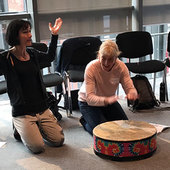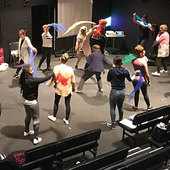
Download the pdf of Music - In tune
Although the Department for Education’s National Plan for Music Education acknowledged that ‘music teaching starts in the early years’, funding for music education hubs across the country is restricted to ages five to 18.
Concerned about the lack of music-making opportunities for young children, the ‘Tri-borough’ music hub of Westminster, Kensington and Chelsea and Hammersmith and Fulham set up the Tri-Music Together project to provide training for early years practitioners in maintained schools and nurseries, PVIs, children’s centres and childminders’ settings, as well as for music professionals who work or are interested in working with young children.
A consortium of 14 partners (see box) and £100,000 funding from the Youth Music charity helped establish the two-year programme, which started in September 2016.
Nicola Burke, EYFS strategic lead for Tri-Music Together, says the programme was developed based on the hub leaders’ conviction that children in the early years should have access to quality music experience from birth.
‘We are lobbying to get music funding in early years education because it’s not fair that they don’t. It’s completely wrong.
 ‘I strongly believe everyone is born musical, and music threads through everything. It is fundamental and intrinsic to human beings. Children make music throughout the day and sometimes it is not recognised. The visual arts are valued, but music often goes unnoticed because it is invisible.’
‘I strongly believe everyone is born musical, and music threads through everything. It is fundamental and intrinsic to human beings. Children make music throughout the day and sometimes it is not recognised. The visual arts are valued, but music often goes unnoticed because it is invisible.’
MAPPING IT OUT
The initial stages of the project involved a mapping exercise to obtain a picture of current music provision in early years settings and the CPD needs of early years practitioners, teachers and music practitioners. The team then commissioned a range of training sessions in response.
Ms Burke says, ‘We identified a range of needs, some very practical, such as “we need more songs!” as well as other responses which indicated a need to support people to develop their knowledge and understanding. Training in early years music is very minimal within early childhood courses, which leads to a gap in knowledge and understanding of children’s musical development. This is why the project offers some very practical sessions, from half-day singing sessions to the three-day course Championing Music in the EYFS.’
 Courses include training sessions for early years practitioners to develop knowledge of music and music-making, for music practitioners to develop understanding of child development, pedagogy and the early years, and sessions for professionals in the early years and in music to come together to discuss, reflect and share practice.
Courses include training sessions for early years practitioners to develop knowledge of music and music-making, for music practitioners to develop understanding of child development, pedagogy and the early years, and sessions for professionals in the early years and in music to come together to discuss, reflect and share practice.
Ms Burke explains, ‘We believe young children have the right to a music education, so we are focusing not on working with children but on working with people who work with children.
‘Children should have the opportunity to access a wide range of musical experiences and then form their own preferences. However, music is often only offered in adult-led circle time, or not offered at all. We want to help practitioners to be more confident with music and less scared of it.’
By the end of its first year, the programme had engaged 156 people in 72 different settings.
The hub is now planning a longer project in the most deprived wards of the Tri-borough, where practitioners from 10 early years settings are partnered with 10 music leaders. They will work together for three days in their individual settings and then come together for two and a half days to reflect together on what they have done and how to support music development.
The project offers a range of course topics each term. In spring 2018, training sessions include:
- Bang That Drum! Child-initiated Music-Making – through practical activities using percussion instruments, stories and props.
- Meaningful Music through Topics and Themes – linking musical learning to EYFS topics and themes and helping to improvise and compose new verses and versions of classics.
- Twilight EY Music Practice Sharing Session – sharing songs, ideas and musical games between early years practitioners, teachers and music leaders.
TEACHING MUSIC, BY AN EARLY YEARS PRACTITIONER
Barbara Ciwinska, manager of the Beanstalk Montessori Nursery School in Hammersmith, says her experience of the project ‘gave a delicious insight into the importance of music within a childcare setting. It helped us to change the way we deliver music classes from toddlers to pre-school children.
‘Music helps children gain confidence and independence, become experimental, develop their listening and social skills, and gives them a fun and creative learning tool.
‘Once back at our setting, the teacher who took part in the training was able to start teaching music twice a week. Our mid-week session was for two-year-olds and included introducing all the instruments, a monkey puppet called Mr Bananas, and dancing with bubbles and rainbow ribbons.
‘In one particular session, we used giant cardboard boxes to drum along to African music. This brought out some hidden skills and confidence in some of the youngest children.
‘The second session was for all ages, and in this class we tried to incorporate a number and letter-based learning programme using action rhymes and songs, props, games and instruments. We also added some drama and movement. The children responded to this very well. We noticed that children who had previously shown little or no interest in the more academic areas of learning were starting to visit those areas of the classroom more, and seemed to find an inner confidence in doing so. The children ask almost every day, “Are we having music time today?”’
TEACHING EARLY YEARS CHILDREN, BY A MUSIC PRACTITIONER
For Hannah Larkin, a music teacher at Beckford Primary School in Camden, a variety of courses through Tri-Music Together helped her to understand an early years-specific approach. Prior to attending the courses she worked only with children over five.
‘The courses really opened my eyes to how to approach working with young children and gave me an insight into how they view the world and how they make sense of it through music,’ she says. ‘It’s changed really small things, even my ways of speaking. If you come in and say “right, we’re going to do this now”, they look at you like you’ve come from a spaceship. Now I know you have to take the lead from them, not go in with so much pre-planned activity, and realise that you can make anything musical.
‘I have very high expectations and I didn’t know what to expect with younger ones. We talked about the pictures four-year-olds draw – they’re usually all skewiff! – and were taught to imagine their music like that, but simultaneously to respect and acknowledge them as experts, and boost their musical confidence. Ultimately, if they can do music, they can do anything.’
Ms Larkin now feels able to tailor music to a younger audience.
‘We did a lot of work on linking music to the curriculum, so, for example, when the children were reading the book Where the Wild Things Are, I took them on a “rumpus” round the playground.’
LINKING MUSIC TO THE EYFS

Meriel McCauley, early years co-ordinator and Reception teacher at St Charles Catholic Primary School in Ladbroke Grove, says she gained an understanding of how to embed music in her EYFS practice.
‘As a teacher I have a different education from our music specialists, and I wanted to know how to bring music into our provision as a whole. I’m not particularly musical, but I enjoy music, so it was a good education for all of us.
‘As a team we were used to controlling noise and weren’t sure what should be allowed, or what the difference was between messing about and something developmental.
‘We made a music wall with artists the children liked, to celebrate music more. We also reassessed what we were listening to, making playlists based on what the children liked and what they listened to at home. Basically, we ditched Liszt for Bob Marley!
‘This showed us some of their hidden skills, like singing and dancing. When we played the music we thought was child-friendly, the children didn’t particularly react, but they became different characters when we played music they were familiar with from home.
‘We got them to compose and conduct with symbols; for example, drawing a cross to represent a drum, a triangle for a triangle and a circle for a xylophone. We also invited our music teacher into our lessons. She brought her bassoon with her and played to the children. When they saw what she was doing, some danced, and some rolled up paper and joined in, which was really lovely to watch.’
PARTNERS
The Tri-borough Early Years Music Consortium (TBEYMC, www.triboroughmusichub.org/early-years) consists of 14 partner organisations that contribute to the work of the Tri-Music Together project, often delivering course content on its behalf. The organisations are:
- The Royal Albert Hall
- Wigmore Hall
- The Royal College of Music
- Tri-borough Music Hub
- The Voices Foundation
- Chickenshed Kensington & Chelsea
- Creative Futures
- Inspire-Works
- Musichouse for Children
- The Royal Borough of Kensington and Chelsea Children’s Centres
- The London Borough of Hammersmith and Fulham Children’s Centres
- Westminster City Council Children’s Centres
- Tri-borough School Standards Education Service
- Sound Connections









